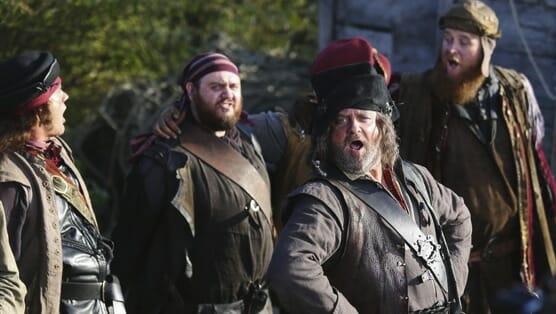Galavant: “Two Balls” and “Comedy Gold”

Oh, January, you give me so little to look forward to, but now, there’s Galavant. I know our little lover’s tryst has an end date (February), but for the moment, I will enjoy our Sunday nights together without thinking of the morrow. And, seriously—what other show sings their “Previously, on…” in rhyming verse? As we learn from the first musical number, when we last left our hero, Isabella had convinced/tricked Galavant into traveling to the castle to rescue her parents and the beloved Madalena.
Episode three, “Two Balls,” felt very Mel Brooks-y (one of the highest compliments for a broad comedy). The traveling trio stops off in Sidney’s home town, and the crew learns that Sidney has told his parents that he is not a squire to a famous knight, but rather that he IS the famous night, and Galavant is just a squire. In honor of Sidney, they have renamed the town, “Sidneyland,” (spelled in similar font to “Disneyland”). Like a rock star, he signs a wench’s chest with a plume. Sidney also imparts that he was adopted, which explains why he doesn’t look like his parents, but doesn’t explain why he is the only one in his village with a British accent…
The village burst into a “Fiddler on the Roof”-style musical number, “Oye, what a knight!” that features great lines like, “God is he an eyeful/ Any girl would give an eye for/ Such a hunk of Kosher meat.” And then there’s, “Speaking as his rabbi/ Why am I not surprised/ Our Sidney is the Sir who put the Sir in circumcised.”
Sidney begs Isabella and Galavant to play along. Isabella is pleased, as her family’s fun time involved lots of performance theatre. She eagerly takes things a little too far, telling Sidney’s parents that they are engaged. The family sets up a ball to celebrate the marriage, but Galavant is excluded. Rather, he must hang out with the other squires, who have a lot to say about the knights they serve. Through a musical song and dance, Galavant “gets off his high horse” and learns to appreciate Sidney more, and also realizes how much of a jackass he is to him.
At the end of the ball, Galavant approaches Sidney, telling him how much he depends on him, but that he mostly appreciates his honesty about who he is. He advises him to come clean to his parents about being a mere squire, and Sidney listens.
Back at the Valencian Palace, Madalena sports a lovely golden crespinette as she deals with her wimpy husband. He is awkwardly trying to entertain the captive Valencians, but to no avail. Even kicking the eunuch where his balls used to be doesn’t make them laugh. The eunuch mentions that for entertainment, the palace, “used to have balls.” Of course, immature King Dicky finds this incredibly funny. To entertain the Valencians, the king decides to throw them a ball.
The king enlists the drummers that play at executions to play at the ball. They have a hard time changing their rhythm from a death march, but eventually get the ball rolling. Their lyrics, “Dance until you die,” aren’t as enticing for the captive Valencians. (Hostages can be the most difficult guests.) King Richard tries to pep up the crowd by offering that they roast him. He takes in stride and laughter comments about how he is pompous and stupid, but doesn’t love it when the eunuch shouts out that the king “would have to be blind not to notice that his wife is getting it on with the jester.” The king calls off the party, and demands that Gareth execute the eunuch. Cue the death march.
Something often happens in the middle of a TV show’s season. It’s a bit like Wednesday hump day, and it slows down right before it revs up. “Comedy Gold” was not as strong as the first three episodes. The numbers were less catchy, the storyline a bit more belabored. However, while this episode was not on par with the others, it still incited that childish, simple laughter.
In the palace, King Richard is devastated when he learns that Madalena is cheating on him. He realizes the jester has something he doesn’t have: humor. Even though he really wants to kill the jester, King Richard hires the jester’s to teach him how to be funny, all throughout the song, “Comedy Gold.” But the king is too out of touch to make jokes. After his lesson, he performs standup, and he croaks. He uses his big finale, a pie to Gareth’s face, to get the crowd rolling. Madalena actually giggles. Perhaps she can learn to love him?